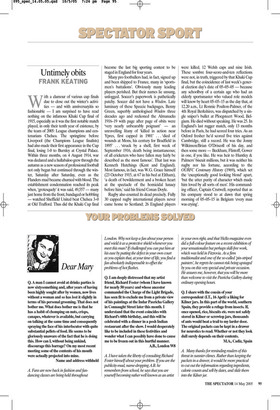Untimely obits
FRANK KEATING
With a clamour of various cup finals due to close out the winter’s activities — and with anniversaryitis so fashionable — I am surprised to have read nothing on the infamous Khaki Cup final of 1915, especially as it was the first notable match played, in only their tenth year of existence, by the team of 2005: League champions and centenarians Chelsea. The springtime before Liverpool (the Champions League finalists) had also made their first appearance in the Cup final, losing 1-0 to Burnley at Crystal Palace. Within three months, on 4 August 1914, war was declared and a hullabaloo grew through the autumn as a new season of professional football not only began but continued through the winter, Saturday after Saturday, even as the Flanders mud became churned with blood. The establishment condemnation reached its peak when, ‘grotesquely’ it was said, 49,557 — many just home from the front, bandaged or hobbling — watched Sheffield United beat Chelsea 3–0 at Old Trafford. Thus did the Khaki Cup final become the last big sporting contest to be staged in England for four years.
Many pro footballers had, in fact, signed up and been shipped to France, many in ‘sportsmen’s battalions’. Obviously many leading players perished. But their names lie unsung, unlogged. Soccer’s paperwork is pathetically patchy. Soccer did not have a Wisden. Late luminary of these Speccie backpages, Benny Green, superbly anthologised Wisden three decades ago and reckoned the Almanacks 1916–19 with page after page of obits were ‘very nearly unbearably poignant’ — an unravelling litany of ‘killed in action near Ypres, first capped in 1901’ ... ‘died of wounds at Mons, his century for Bradfield in 1895’ ... ‘struck by a shell, first week of September 1916, death being instantaneous; of all cricketers who have fallen may fairly be described as the most famous’. That last was Kenneth Hutchings (Kent and England). Most famous, in fact, was W.G. Grace himself (23 October 1915, at 67 in his bed at Eltham), ‘a death of bewilderment and a broken heart at the spectacle of the homicidal lunacy before him,’ said his friend Conan Doyle.
Rugby also counted its dead precisely. Fully 30 capped rugby international players never came home to Scotland; 26 England players were killed, 12 Welsh caps and nine Irish. These sombre four-score-and-ten reflections were not, in truth, triggered by that Khaki Cup final, but the coincidence of last week’s general election day’s date of 05–05–05 — because any schoolboy of a certain age who had an elderly sportsmaster who valued role models will know by heart 05–05–15 as the day that, at 12.20 a.m., Lt Ronnie Poulton-Palmer, of the 4th Royal Berkshires, was dispatched by a single sniper’s bullet at Ploegsteert Wood, Belgium. He died without speaking. He was 25. In England’s last rugger match, only 13 months before in Paris, he had scored four tries. As an Oxford fresher he’d scored five tries against Cambridge, still a record. He was the Jonny Wilkinson/Brian O’Driscoll of his day, and then some more — Beckham, Flintoff, Gower in one, if you like. He was heir to Huntley & Palmers’ biscuit millions, but it was neither his rugby nor his fortune, according to the OIIRFC Centenary History (1969), which set the ‘exceptionally good looking blond’ apart, ‘but the utter purity of character which made him loved by all sorts of men’. His commanding officer, Captain Crutwell, reported that as his company stood to at dawn that spring morning of 05–05–15 in Belgium ‘every man was crying’.


































































 Previous page
Previous page